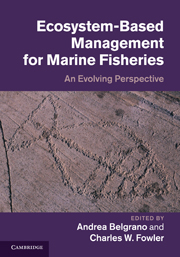Book contents
- Frontmatter
- Contents
- List of contributors
- Foreword
- Acknowledgments for cover artwork
- Introduction
- PART I CURRENT FORMS OF MANAGEMENT
- 1 Food-web and climate-related dynamics in the Baltic Sea: present and potential future applications in fish stock assessment and management
- 2 Northwest Atlantic ecosystem-based management for fisheries
- 3 Alaska marine fisheries management: advances and linkages to ecosystem research
- 4 A pragmatic approach for ecosystem-based fisheries assessment and management: a Korean marine ranch ecosystem
- PART II ELEMENTS OF IMPORTANCE TO MANAGEMENT
- PART III USING PATTERNS
- Afterword
- Index
- Plate section
4 - A pragmatic approach for ecosystem-based fisheries assessment and management: a Korean marine ranch ecosystem
from PART I - CURRENT FORMS OF MANAGEMENT
Published online by Cambridge University Press: 17 February 2011
- Frontmatter
- Contents
- List of contributors
- Foreword
- Acknowledgments for cover artwork
- Introduction
- PART I CURRENT FORMS OF MANAGEMENT
- 1 Food-web and climate-related dynamics in the Baltic Sea: present and potential future applications in fish stock assessment and management
- 2 Northwest Atlantic ecosystem-based management for fisheries
- 3 Alaska marine fisheries management: advances and linkages to ecosystem research
- 4 A pragmatic approach for ecosystem-based fisheries assessment and management: a Korean marine ranch ecosystem
- PART II ELEMENTS OF IMPORTANCE TO MANAGEMENT
- PART III USING PATTERNS
- Afterword
- Index
- Plate section
Summary
Abstract
An integrated fisheries risk assessment method has been developed recently for assessing fisheries at the ecosystem level. It makes use of objectives, indicators, and reference points to assess the states of species, fisheries, and ecosystems. This pragmatic method for assessing fisheries at the ecosystem level involves a two-tier system to accommodate the quantity and quality of the available data. A number of indicators were selected for both tiers to assess systems for three management objectives, namely, sustainability, biodiversity, and habitat quality. Nested risk indices were developed to assess ecosystem status at the management unit level. The complexity and usefulness of the method were demonstrated by applying it to the “Tongyeong marine ranch” in Korea. It is hoped that assessment and management at this level will prevent significant and potentially irreversible changes in marine ecosystems caused by fishing, and aid efforts to recover depleted fish stocks in Korean marine ecosystems.
Introduction
The basic and inter-related problems of current world fisheries include the threat of over-exploitation of resources, over-capitalization or over-expansion of fishing fleets, and the negative consequences of fisheries on the survival of marine life and associated habitats. The diverse, dynamic, and complex nature of fishery management problems necessitates the development of a process that accounts for more human interactions, as well as improved definition of biological indicators that can be applied. Resource managers, researchers, user groups, and other interested parties must be involved in the process to minimize conflict and maximize commitment to sustainable management (Zhang and Marasco 2003).
- Type
- Chapter
- Information
- Ecosystem Based Management for Marine FisheriesAn Evolving Perspective, pp. 153 - 180Publisher: Cambridge University PressPrint publication year: 2011



